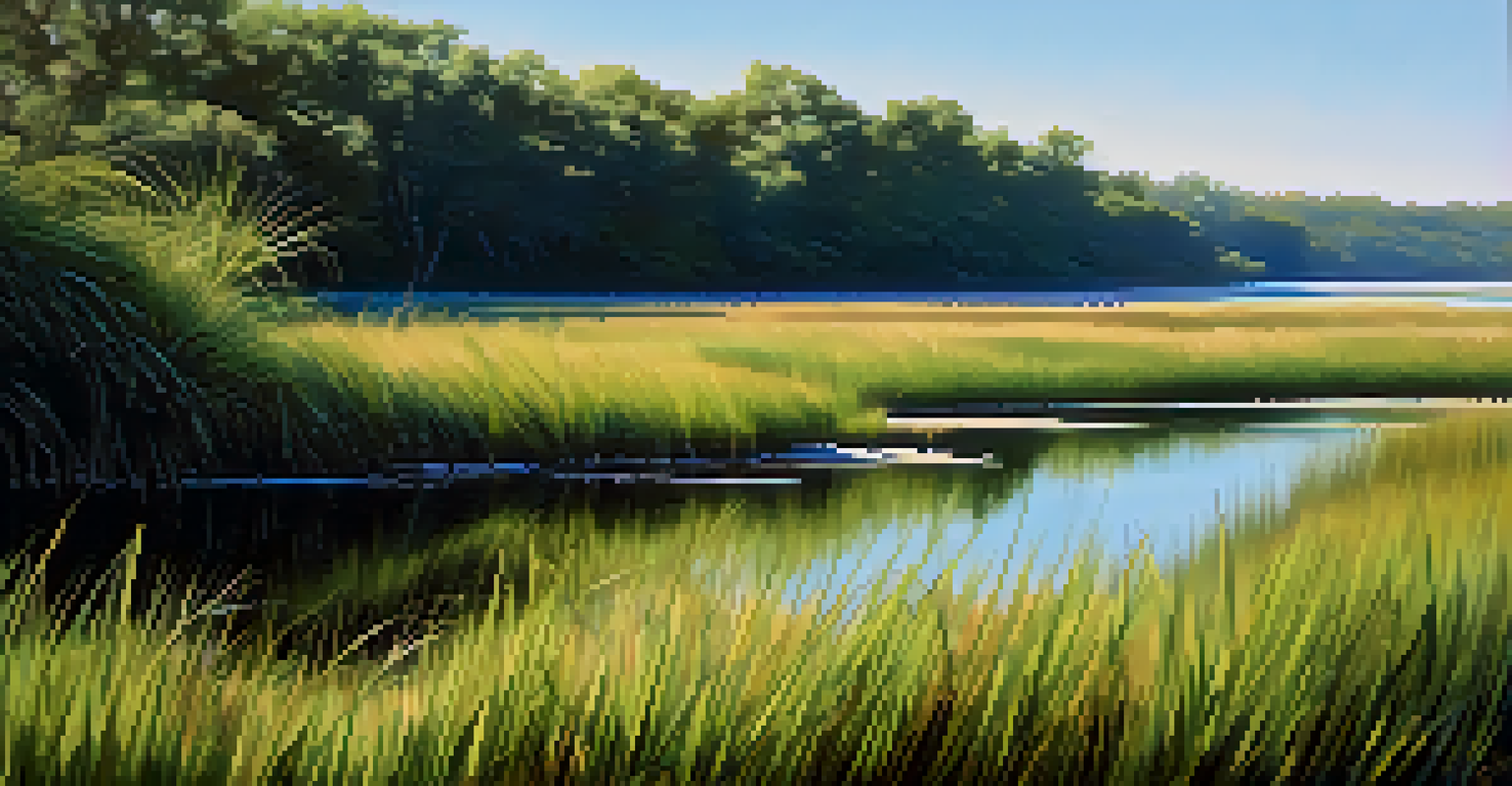Biodiversity in Georgia: Protecting Natural Resources

Understanding Biodiversity: What It Means for Georgia
Biodiversity refers to the variety of life found in a particular habitat or ecosystem. In Georgia, this diversity ranges from the lush forests of the Appalachian Mountains to the unique wetlands of the coastal plain. Each ecosystem supports various species, playing a crucial role in maintaining ecological balance.
The greatest threat to our planet is the belief that someone else will save it.
The importance of biodiversity goes beyond mere aesthetics; it provides vital services such as clean air and water, pollination of crops, and disease regulation. By protecting these diverse ecosystems, we also safeguard the natural resources that sustain our communities and economies. Biodiversity is essentially the foundation of our natural heritage.
In Georgia, the preservation of biodiversity is not just an environmental concern but a necessity for our health and well-being. The state's rich natural landscapes are home to numerous species, some of which are endemic and found nowhere else in the world. Protecting them ensures the survival of these unique species and the ecosystems they inhabit.
The Unique Ecosystems of Georgia: A Closer Look
Georgia is home to a wide variety of ecosystems, each with its own unique set of flora and fauna. The Blue Ridge Mountains, for instance, boast a rich diversity of plant species, some of which are rare or endangered. Meanwhile, the coastal marshes provide habitat for migratory birds and marine life, showcasing the state's ecological richness.

These ecosystems are interconnected, meaning that protecting one area contributes to the health of others. For example, the preservation of wetlands not only supports aquatic species but also helps filter pollutants and reduce flooding. This symbiotic relationship underscores the importance of a holistic approach to conservation.
Biodiversity's Importance in Georgia
Biodiversity provides essential services that sustain ecosystems and communities in Georgia.
Moreover, Georgia's diverse ecosystems offer numerous recreational opportunities, from hiking and birdwatching to fishing and kayaking. These activities not only enhance our quality of life but also foster a deeper appreciation for the natural world, encouraging more people to get involved in conservation efforts.
Threats to Biodiversity in Georgia: What We Face
Despite its rich biodiversity, Georgia faces several threats that jeopardize its natural resources. Urbanization, agricultural expansion, and industrial development have led to habitat loss, fragmentation, and degradation. As human populations grow, the demand for land and resources continues to increase, putting immense pressure on local ecosystems.
Conservation is a state of harmony between men and land.
Climate change is another looming threat, with rising temperatures and shifting weather patterns impacting species distribution and ecosystem health. For instance, some plants and animals may struggle to adapt to changing conditions, leading to declines in their populations. This disruption can have a ripple effect on the entire ecosystem.
Invasive species also pose a significant threat to Georgia's native biodiversity. These non-native plants and animals can outcompete local species for resources, altering habitats and reducing biodiversity. Addressing these threats requires a concerted effort from individuals, communities, and government agencies alike.
Conservation Efforts: Protecting Georgia's Natural Legacy
Fortunately, various organizations and initiatives are working tirelessly to protect Georgia's biodiversity. Conservation groups engage in habitat restoration, species protection, and public education to raise awareness about the importance of biodiversity. These efforts are crucial in reversing the damage done to ecosystems and ensuring their sustainability.
Government agencies also play a vital role in conservation, implementing policies and regulations that protect natural resources. Programs aimed at preserving endangered species and restoring habitats are essential for maintaining the delicate balance of Georgia's ecosystems. Collaborative efforts between public and private sectors amplify the impact of these initiatives.
Threats to Georgia's Ecosystems
Urbanization, climate change, and invasive species pose significant risks to Georgia's rich biodiversity.
Community involvement is equally important in conservation efforts. Local citizens can contribute by participating in tree planting events, wildlife monitoring, or supporting sustainable practices. When individuals take action, they not only help protect biodiversity but also foster a sense of stewardship over the environment.
The Role of Education in Biodiversity Conservation
Education plays a pivotal role in promoting biodiversity conservation in Georgia. By raising awareness about the significance of diverse ecosystems, communities are more likely to engage in protective measures. Schools and organizations often host workshops, field trips, and programs to teach individuals about local wildlife and habitats.
Informative campaigns can inspire individuals to take action, whether through volunteering for conservation projects or adopting sustainable practices in their daily lives. Knowledge empowers people to make informed decisions that positively impact their environment. Understanding the interconnectedness of ecosystems encourages a mindset of preservation.
Additionally, educational initiatives can foster a sense of pride in Georgia's natural heritage. By celebrating the state's unique biodiversity, residents are more likely to advocate for its protection. This grassroots approach to conservation can lead to significant changes in attitudes and behaviors toward the environment.
Community Involvement: The Key to Successful Conservation
Community involvement is essential for the success of biodiversity conservation efforts in Georgia. Local residents possess valuable knowledge about their ecosystems and can provide insights into the specific needs and challenges faced by their communities. Engaging community members fosters a sense of ownership and responsibility for local natural resources.
Grassroots movements and volunteer programs have proven effective in restoring habitats and protecting endangered species. For instance, community-led beach clean-ups not only enhance local environments but also raise awareness about the impact of pollution on ecosystems. These initiatives show that collective action can yield significant results.
Community Role in Conservation
Community involvement is crucial for effective conservation efforts, fostering a sense of ownership and responsibility.
Moreover, when communities come together to advocate for conservation policies, their voices can influence decision-makers. By participating in local government meetings or supporting conservation organizations, residents can push for the implementation of sustainable practices. This collaborative approach strengthens efforts to protect Georgia's biodiversity.
Looking Ahead: The Future of Biodiversity in Georgia
The future of biodiversity in Georgia hinges on our collective actions today. By prioritizing conservation efforts, we can protect the unique ecosystems that define our state and ensure their health for generations to come. It’s crucial to remain vigilant and proactive in addressing the threats posed by urbanization, climate change, and invasive species.
Innovative solutions, such as sustainable land use practices and renewable energy initiatives, can help mitigate the impact of human activities on biodiversity. By investing in green technology and conservation programs, we can create a more sustainable future that harmonizes human needs with environmental protection. Every small step counts towards a larger goal.

Ultimately, fostering a culture of environmental stewardship will be key to preserving Georgia's natural resources. By inspiring future generations to value and protect biodiversity, we can ensure that the rich tapestry of life in Georgia continues to thrive. Together, we can make a difference in safeguarding our planet's precious resources.